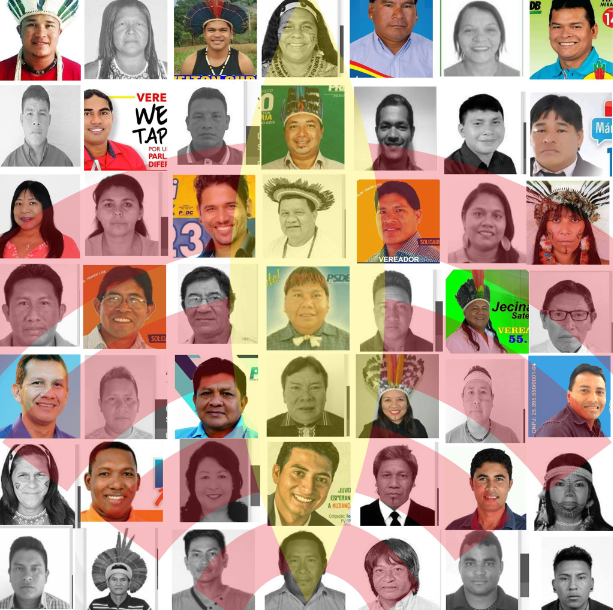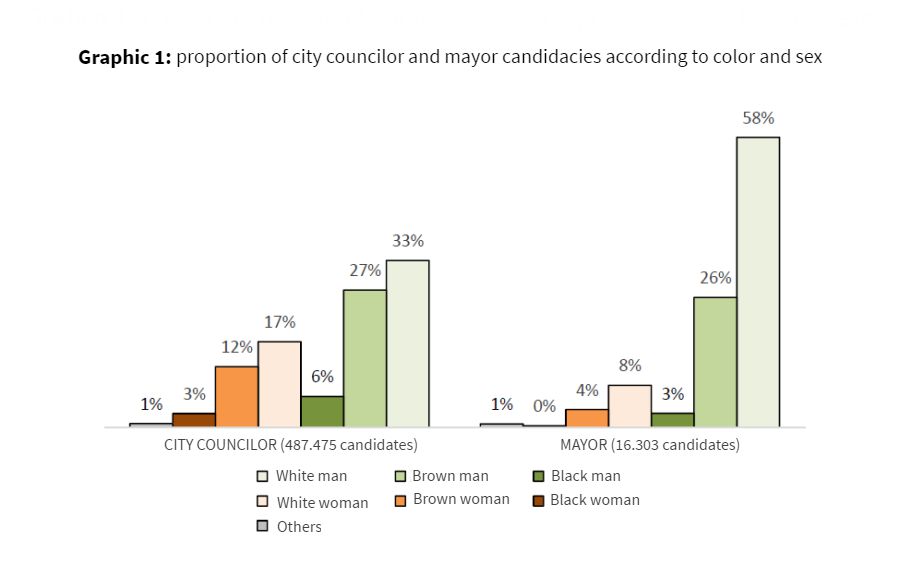
InternetLab Reports #5: Indigenous candidacies on the agenda
Over the last month we noticed that the issue of representativeness has permeated the discussions about the municipal elections and that the Internet has been establishing itself as a privileged place for campaigns for the visibility of candidacies and the commitment to agendas — like the ones related to Human Rights.
The overrepresentation of older white men in elective positions is well-known; and in 2014, when the Superior Electoral Court started releasing data on the ethnic and racial profile of the candidates, the disproportions became even more evident.
On the current run, a similar mapping was done by the Group of Multidisciplinary Studies of Affirmative Actions linked to the State University of Rio de Janeiro. A bulletin published this week showed that indigenous candidacies, for instance, don’t even reach 1% of the total of candidates registred this year:

Like in other underrepresented social groups, or ones that for diverse social and historical reasons have more difficulties in having candidates or making their campaign visible — like blacks and LGBTTIs –, indigenous people have also been making lists of visibilization of candidacies on the Internet. For the 2014 elections, not only was a list concentrating the indigenous candidates of several Brazilian regions made, but also another one pointing out candidates in which not to vote — consisting mainly of members of the Rural Caucus.
In this elections, the website Radio Yandê also published a list of indigenous candidacies across the country. In a video that accompanies the list, Denilson Baniwa points out that to vote in indigenous people compromised with the demands of this group is fundamental in a context in which rights are threatened, so that, in his words: “no one decides for us”.

The assembling of these candidacies gains importance as a strategy of visibility in a context of challenges of various types for indigenous candidates. For example, in the article that accompanies the list, Portal Radio Yandê talks about the reasons behind the dropping out of David Martim, of the Guarani Mbyá in São Paulo, for the City Council run and what led to his decision:
“Our fight as indigenous people has always faced great challenges on the way and our people have always succeeded in the form of resistance and fight. To enter the partidary political life is not an easy choice to be taken by an indigenous leader, but this was my choice this year, I decided to take a municipal candidacy for the São Paulo City Council. I remember the advices and all the support I’ve had from friends and people who understand the importance of the indigenous representation in parliament, and I received all the support of my community to face this challenge. It was 15 days, from the register at the Regional Electoral Court until the last days of the campaign. Days that were marked by hard work and effort of a few people who were directly supportive. On the other hand, as it was the first time that a Guarani candidate ran in São Paulo, I expected the minimal support necessary from the party, like sharing experiences so that this process was something of partnership and construction. The lack of support and the bureaucracy made me think a lot about giving up, as for example, in a banking operation, the suggestion is to move the account through cheques and when I solicited that to the bank, they told me that the account needed to have at least R$500 in order to receive the cheque book, this value coming from donations. This is money I never had during the campaign. The resources of my campaign depended on contributions, how could I ask for the support of my community if we barely have conditions to sustain ourselves? To become a candidate, I had to step away from school and be unemployed without means to provide for my family. This made me reflect and understand that I may have little financial resources to lead a partidary political life, but I have the spirit of a fighter and the courage to face life’s challenges with my people. I have always felt the difficulties of my people on my skin and I fight so that we have better days.”
Beyond financial reasons, other factors signify difficulties not only for candidates, but also for the indigenous voter of communities that incorporate the elections to their practises. These struggles are mainly related to their geographical positioning, which in many cases implies in great distance from the digital ballot boxes and the struggle to access a high quality Internet. It also calls the attention that in this context — as for other identity groups as well — the bet is on the Internet as the visibilization and mobilization medium.
Team resposible for the content: Mariana Giorgetti Valente (mariana@internetlab.org.br), Natália Neris (natalia.neris@internetlab.org.br), Juliana Pacetta Ruiz (juliana.ruiz@internetlab.org.br) and Clarice Tambelli (clarice.tambelli@internetlab.org.br).
Translation: Ana Luiza Araujo.